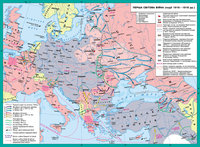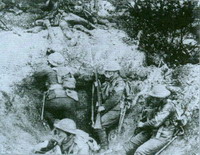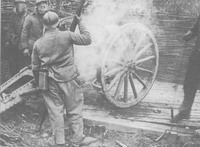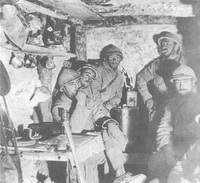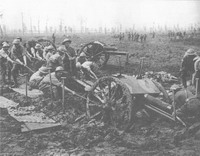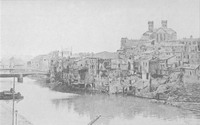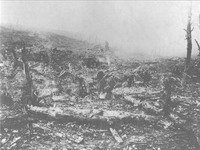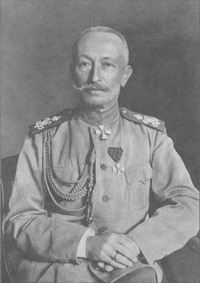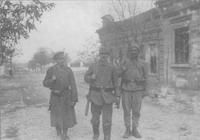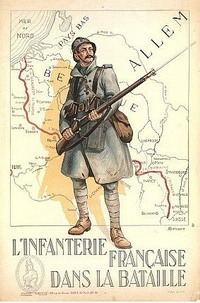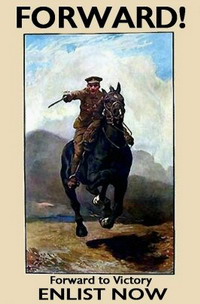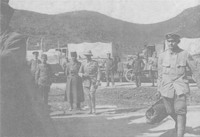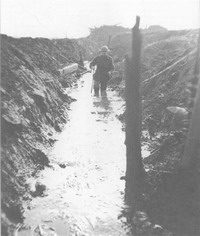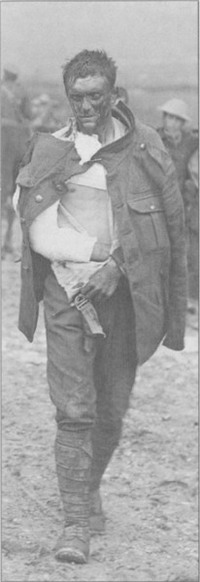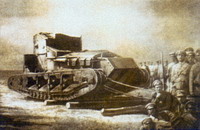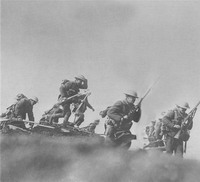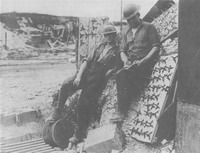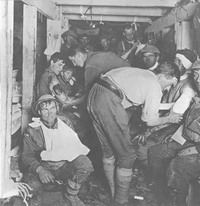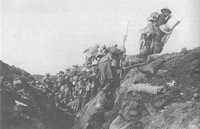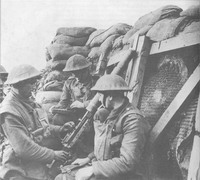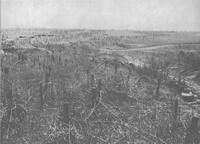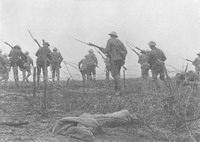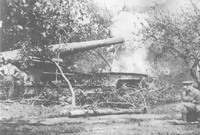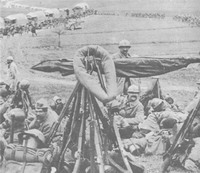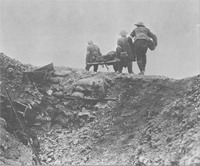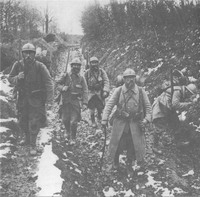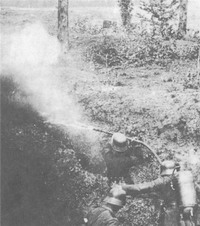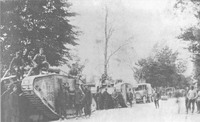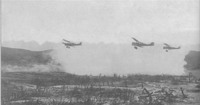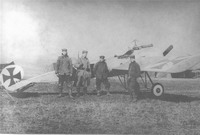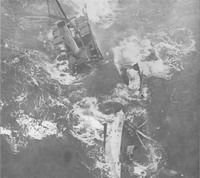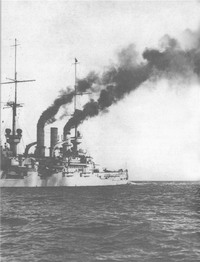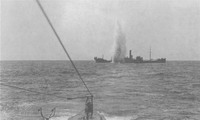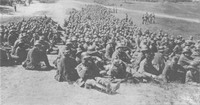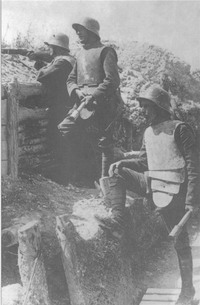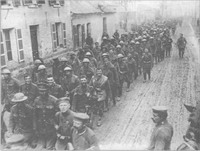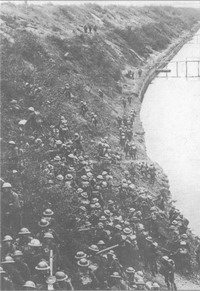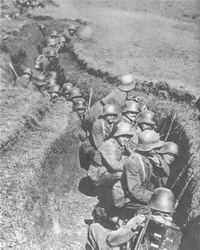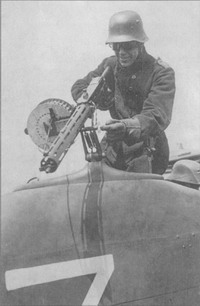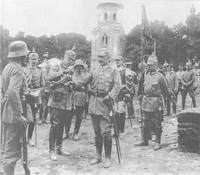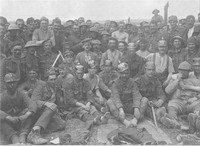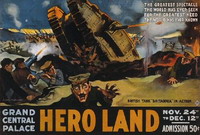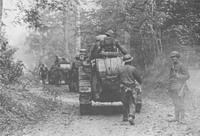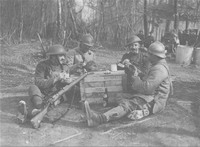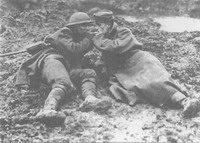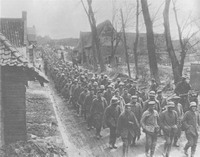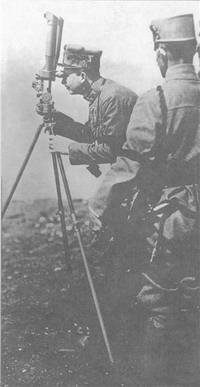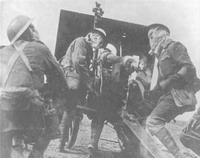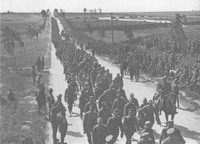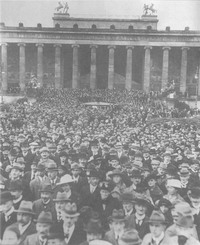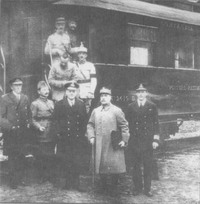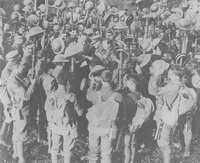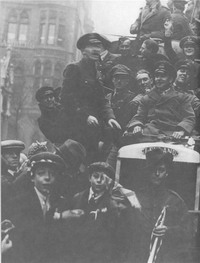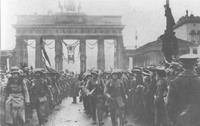the German command had the impression that victory in the east and provided you take on opponents in the west. February 21, 1916 German troops in the area of 40 km length of the front attacked. He was preceded by devastating artillery training. Unprecedented strike force against the fortress of Verdun spryamovuvavsya. Well fortified, it was the edge of the French Defense. According to German plans, the risk of losing this key position will force the French to throw all their energy here. But just raised German infantry to the attack, she narazhalasya on reckless fire. In several months of bloody battles the Germans managed to go deep in the French defense only 7 km. Run the front or even capture Verdun they failed.
Force vysnazhuvalysya both sides every day. In the midst of the battle of Verdun command of German troops was given to winners of Russians-General Field Marshal von Hindenburg and P. E. General Ludendorff. New command recognized hopeless further attack on Verdun: Verdun has become an open wound, which undermines our strength ?».
France waiting for help from Russia and England. Indeed, June 4, the Russian armies under the command of General Alexander Brusylov after a brief but powerful artillery preparation broke through Austro-German front in four places at once. Success was achieved on the offensive with new tactics, the Russians inflicted a blow not in one place, as has been done before, and while a few that do not involve the enemy troops charge to repel attack. Thanks to successful offensive the Russians reoccupied most of Galicia and Bukovina. Total losses of Austro-German forces were 1.5 million soldiers, of which about 400 thousand captured. The Russians captured 500 guns and plenty of other weapons, losing three times less personnel (among other 62 thousand people). The German command troops hastily filmed on the west and east perekydalo them. The success prompted the Russians to join the war on the side of the Entente Romania (August 16, 1916). However, Romanian troops were quickly defeated and the country was occupied by hostile troops. The Russians had to deliver a new ally, the front line that extended for another 500 km (near the East to West and Southwest also formed Romanian front).
July 1, 1916 French and British troops launched an offensive on the River Somme. Squally gunfire that lasted seven days, destroyed the German wire fences, trenches, moves traffic. In front of each meter Anglo-French artillery vyverhnula about one ton of metal. In addition to infantry, the first breakthrough came tanks (15 September 1916). The success of the tank attack was impressive, the Anglo-French vyska deepened into the enemy's defense for 5 miles with minimal losses. Earlier this breakthrough achieved cost tens of thousands of lives. But German troops kept the pressure, and fall active hostilities ceased on the river Somme. In December, ended without result and the battle of Verdun.
Results
military campaigns in 1916 in the West were stunning. At Verdun killed up to 1 million German and French soldiers and officers. On the river Somme, both sides have lost more than 1.3 million soldiers.
such terrible sacrifices have not determined the winner. The war continued. Constantly improved lethal weapons and technology. To destroy people used artillery, tanks, air force, chemical weapons. In terms of technical equipment of the Anglo-French troops ahead of Germany. Vysnazhuvala War adversaries, requiring the mobilization of the last human, material and food resources. The most disastrous situation after the battles of 1916 happened in Germany, whose army was reduced to 1 million soldiers whom they had not been replaced.
eve of the war Germany placed great emphasis on creating a huge surface fleet, which would be able to defeat the main naval power of England. But with the war the German navy was unable to resist naval blockade established by the Entente countries. Acts restricted only by the German Navy Baltic Sea, and the Austro-Hungarian - Adriatic. Only a small force of German ships, found themselves with the war in the vast world ocean have caused some worries allies. Thus, in the Black Sea under Turkish flag German cruisers "Heben" and "Breslau" fired Odessa, Sevastopol, Feodosia and Novorossiysk. In the Atlantic and Pacific Oceans were German raider who tried to disrupt maritime traffic between the Entente countries. But at the end of 1914 after the defeat of the German squadron in the South Atlantic near the Falkland Islands Triple Alliance states were in the final naval blockade.
began the search for new effective means of War. Saving ubachavsya to deploy underwater war. Effective submarines have already shown in 1914 Yes, the German submarine boats «U-9" with impunity by one attack off the coast of the Netherlands sent to the bottom with three British cruisers.
In February 1915, Germany declared all water that washed the UK, a zone of hostilities here and directing their submarines. May 7 attack was the subject of British passenger liner "Luzytaniya with 1198 passengers on board, of which 124 were Americans. Death "Luzytaniyi" was a major maritime disasters. USA made a strong protest, because, in addition to casualties, submarine warfare inflicted damage American trade. Avoiding conflict with the U.S., Germany temporarily restricted underwater war. The German command gave the order not sink passenger ships without warning. In practice, the commanders of submarines this order is often not done.
In May-June 1916 between the English and German navy was the largest naval battle in the war. In it from both sides attended the main force fleet. The German command took on breakthrough naval blockade. The collision happened with the English fleet in the North Sea off the coast of Jutland. German navy tried rozsikty British fleet to split it in parts, but very nearly found itself cut off from their bases and hurriedly left the battle. During the battle anliytsi lost 14 ships, the Germans - 11.Povernuvshys on base, the German fleet over the high seas did not appear.
in Germany again active supporters of unrestricted submarine war. "We will drown cod even if it will float to England" - they supported the Kaiser Wilhelm II. Entente countries suffered from German submarines (the bottom has been sent to more than 2000 vessels). On the call said the deployment of German Entente shipbuilding, development of effective means of combating submarines. Aggression Germany resented the world community. Death of American ships, especially American citizens more nastroyuvalo U.S. public against Germany. It became clear that the submarine war can not decide the fate of the war that was becoming protracted.
yet in 1915 the warring parties faced difficulties supplying armies. Biggest dyfitsyt weapons because of the weakness of economy, felt Russia. To expand the scale of military production, was introduced strict state regulation of economy. The state determined the amount of required production order placed, provided the raw materials and labor. Labor service was introduced that gave the opportunity to reduce labor shortage caused by conscription of nearly all adult men to the army. As military production grew at the expense of the civilian, there was shortage of consumer goods, which made the lead in price regulation, rationing consumption. Mobilization hurt agriculture. In all belligerent countries, except England, food production decreased and this led to the introduction of card distribution system of food. In Germany, which traditionally vvozyla food through the blockade happened very difficult situation. The government there was forced to ban cattle fattened with grain and potatoes, introduced a variety of substitute products - ersatz. The system of state control over production and consumption has become the most rigid form in Germany.
living belligerent countries radically changed. Its level has fallen everywhere. In Germany before 1917 filling grocery cards do not even satisfy physiological needs - famine (Winter 1916/1917 biennium), the victims of which was about half a million people. The difficulties of war causing great mortality among the civilian population. Along with combat losses it has caused population decline of Austria-Hungary, Germany and France.
grave consequences of war most strongly manifested in Russia. The economic and social problems added to the political crisis caused by defeats on the fronts, to distrust the government, its inability to end the war. Shaky position of power the Bolsheviks struggled rozhoyduvaly using famine and chaos in the country for their own purposes. In February 1917 antiwar and social performances in Russia took an unprecedented scale and into a revolution. To save the monarchy failed. In early March the government passed to the Provisional Government. Russia became a republic (proclaimed September 1, 1917). The new government has not renounced the obligations of Tsar Nicholas II to the Allies and, despite widespread protests called to continue the war to the finish.
In 1917 the German command preferred defensive tactics, Entente - offensively. Back in December 1916, Germany presented a proposal to start negotiations for peace, hoping to reserve all the conquered territory. Entente countries rejected this proposal. There was agreement of staff allied armies of simultaneous attack in 1917 on all European fronts.
But the revolution in Russia foiled attack Russian troops. Under the influence of revolutionary events in Russia's massive strikes swept in England, France and Italy. Strikers and demonstrators demanded the cessation of war. From Russia revolutionary sentiments spread in Germany. In April and May on the Eastern Front there were massive German army soldiers fraternization and Russians. Prospects for Russia's withdrawal from the war are extremely alarmed allies, but Germany have added expectations of winning.
the further course of the war had a decisive influence the U.S. position, the only large state that has not been drawn into the war.
United States was a country that never wanted to defeat the Entente. For a long time they were not advantageous to enter the war - because the U.S. supplied the Entente countries firearms, ammunition, food, and with the states of Austro-German bloc trade through neutral countries. In 1914 the U.S. debt to Europe, especially England, was about $ 6 billion. During the war they not only paid off debts, but also turned from debtor to creditor European countries (loans accounted for more than 10 billion dollars). Possible defeat the Entente could make difficult the return of these huge funds. Also, U.S. policymakers wanted the country to play a more important role in international politics, not taking part in the war, could not claim a share in the redistribution of post-war world.
soon became known as dangerous for the allies unfolding events in Russia, 3 rd February 1917 the U.S. severed diplomatic relations with Germany and declared war on April 6. Upon entering the war, the U.S. does not have a connection yazuvaty some commitments on the war hoping to play a leading role during the peace negotiations as chief arbiter. The formal pretext for war was the German dispatch ("Zimmermann Note"), the English intelligence intercepted and handed over to Americans, which spoke of secret talks in Germany and Mexico an alliance against the U.S.. During the year, on the Western Front came more than 2 million American soldiers. American industry has received new orders. For the needs of the Army and Navy allocated considerable resources. Economic, military, financial strength, the U.S. was directed against Germany and has not left her chances of winning.
general offensive of the Entente countries simultaneously on all fronts in the spring of 1917 proved unsuccessful. In April, the combined Anglo-French command attempted to attack the enemy in the region of Reims. Seven weeks of heavy fighting brought no success. French lost killed and wounded more than 500 thousand soldiers. In the French army revolts broke out against the continuation of senseless war. The new commander of French troops, Peten (the hero of Verdun defense) and some severe measures to improve conditions of soldiers staying at the front was able to clean up the military. Meanwhile, in the next six months the whole burden of further battles lay on the shoulders of the English. They managed to conduct several successful operations, which strengthened the spirit of the troops fired Entente. One of these operations in the area of Cambrai (November-December 1917) was a "triumph of tanks. Here, 378 British tanks in conjunction with infantry and aircraft attacked and broke through the enemy defenses sylnoukriplenu. However, to develop the British could not succeed, andle tanks finally proved their military value.
the east in July 1917 Russian troops attacked on the Lviv area. And it cost them to defeat a new and huge losses. German troops entered the counteroffensive. They finally dislodged the Russians from Galicia and occupied Riga.
Meanwhile, the Italians suffered the setback, which suffered a crushing defeat in Kaporetto in October 1917, although they were outnumbered. Italian soldiers retreated in disarray. 300 thousand of them captured, 130 thousand were killed. Only Nice thrown from car on British and French divisions somewhat fixed position and prevented the exit of Italy from the war.
Meanwhile Russia, as a result of the Bolshevik Revolution November 7 (October 25) in 1917, rapidly changing political course. Seizing power, the Bolsheviks signed on December 15 Austro-German command truce. Previously did Romania. February 9, 1918 the Ukrainian Republic signed a peace with the Quadruple block. 3 rd March 1918 between Germany and Soviet Russia signed a separate Brest peace. As a result of peace Germany gained control of significant territory (Ukraine, Poland, Belarus, Baltics, Finland, the Caucasus). In government circles in Germany are beginning to gestate plans to create a powerful empire that would unite the countries of Central, Northern, Eastern and Southeastern Europe.
perekydalysya German troops to the West to gain the final victory over British and French before the arrival of American troops to the front. From late March to early June, the Germans held on the west three offensive operations ("Battle of the Kaiser" or operation "Michelle"). They had some advantages, but lacked an adequate assessment of the enemy. By applying new tactics break defensive lines by assault teams armed with grenades, machine guns Light, mortars, sacrificing the lives of hundreds of thousands of soldiers, they crossed useless and closer to Paris. Here again the Marne decided the fate of the Western Front. The French capital with long-range guns fired bombed by aircraft. But this did not change the general situation. Human Resources Germany exhausted. Around the ailing soldiers reluctantly obeyed the orders of commanders. July 18 the Allies went on the offensive, the Germans refused to useless and have not lost the initiative.
German Final blow inflicted by the Allied troops near Amiens on 8 August, where British tanks broke through the German defense. In a single day was broken 16 German divisions. Commander of the German Army General Field Marshal von Hindenburg declared emperor Wilhelm II on whether the conclusion of peace, while troops are on enemy territory.
Not waiting steps in Germany, under pressure from the Entente troops surrendered Bulgaria September 29. A month of peace invited Austria-Hungary and Turkey.
Austro-Hungarian empire torn by internal conflicts. National liberation movements grew into national and democratic revolution. About the Czech and Slovak republics declared the Czech Republic and Slovakia. Joint independent state of Southern Slavs decided to create the Serbs, Croats and Slovenes. In Galicia was proclaimed an independent West Ukrainian National Republic. In early November, separated from Austria Hungary. Austro-Hungarian monarchy collapsed. November 3 command of the Austro-Hungarian Army signed an armistice with the Entente.
internal situation in Germany has long been uncertain. Rose mass protests against government policy. In April 1917 the host plants of Germany more than 300 thousand striking workers. In August, riots broke out among the navy sailors. After Russia's war with the German army morale is increased, and pidupav. Drive to the west and to die, continuing a war in fact, no one wanted. In Germany nazrivala revolution.
zahrozlyvist Assessing the situation, the German High Command has set an ultimatum demand of the emperor to stop war and prevent the explosion of the revolution. The German government asked the U.S. president asking for a truce and peace making. Wilson agreed to begin negotiations if withdrawal of German troops to occupy the territories and the denial of the Kaiser.
While in Berlin reflected in the city of Kiel, November 3 sailors rebelled. They were angered by an attempt to throw them in command of the last battle. To protect its interests sailors created the first council in Germany. In Berlin, workers went to fight.
November 6th U.S. president said that Marshal Foch authorized representatives to take command of German. The next day German delegation led by Minister Ertsberherom under white flags crossed the front line. Then she arrived at the train station Retond Komp'yenskomu in the forest, where stood the headquarters of Marshal Foch car.
Meanwhile, the revolutionary tide did not abate, and 9 November Germany was proclaimed a republic. Max Badin Chancellor announced the abdication of Kaiser. Authorities went to the Social Democrat Ebert. Negotiations were carried out in the woods Komp'yenskomu on behalf of the new government. In the ultimate, humiliating for the German delegates to form allies put a number of conditions. For two weeks the Germans had to evacuate troops from Belgium, France, Luxembourg, Alsace and Lorraine. They had to cancel the Brest-Litovsk treaty, arms transfer all the winners, to set the captives to their homeland. However, allied commanders agreed to temporarily leave the German forces in Ukraine and the Baltic States to prevent the establishment of Bolshevik control over them. The term truce was 36 days.
At the dawn of November 11, 1918 between Germany and its opponents was signed Komp'yenske truce. At 11 am there was a signal "cease fire". The First World War ended.
More than four years - from August 1, 1914 through November 11, 1918 The First World War lasted. She was drawn into 38 states with a population of over 1 billion people. In the battles killed 10 million, 20 million were wounded or maimed. Losses amounted to one third of the national wealth of the States Parties to the war. In calculating the material it has cost 80 billion dollars.
One outcome of the war was a new balance of power in the international arena. United States began to act as lender of European countries, according strengthened their role in world politics. The world took new shape. In the course of the war political system of Germany, Austria-Hungary, Ottoman Empire and Russia could not stand trial. Empire of Hohenzollern, Habsburg, Romanov, Osman collapsed. On their ruins have new powers. Increased influence of Japan. Shaken the colonial system.
formation of national states in Europe
|
June 1917 - Declaration of Independence of Lithuania |
|
December 1917 - establishment of an independent Finland |
|
January 1918 - Declaration of Independence of the Ukrainian People's Republic of |
|
February 1918 - establishment of an independent Estonia |
|
October 1918 - formation of Czechoslovakia |
|
November 1918 - Declaration of the People's Republic of West |
|
November 1918 - establishment of an independent Polish state |
|
November 1918 - Declaration of the Republic of Austria |
|
November 1918 - Proclamation of the Republic of Hungary |
|
November 1918 - establishment of an independent Latvia |
|
December 1918 - the creation of the Kingdom of Serbs, Croats and Slovenes |
|
June 1919 - Proclamation of the Weimar Republic in Germany |
 English
English
